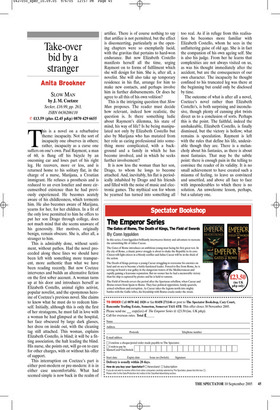Take-over bid by a stranger
Anita Brookner
SLOW MAN by J. M. Coetzee Secker, £16.99, pp. 263, ISBN 0436206110 ✆ £13.59 (plus £2.45 p&p) 0870 429 6655 This is a novel on a rebarbative theme: incapacity. Not the sort of incapacity one observes in others; rather, incapacity as a curse one suffers on one’s own. Paul Rayment, a man of 60, is flung off his bicycle by an oncoming car and loses part of his right leg. He recovers, more or less, and is returned home to his solitary flat, in the charge of a nurse, Marijana, a Croatian immigrant. He refuses a prosthesis and is reduced to an even lonelier and more circumscribed existence than he had previously experienced. He becomes acutely aware of his childlessness, which torments him. He also becomes aware of Marijana, yearns for her, for her children. In a fit of the only love permitted to him he offers to put her son Drago through college, does not much mind that she seems unaware of his generosity. Her motives, originally benign, remain obscure. She is, after all, a stranger to him.
This is admirably done, without sentiment, without pathos. Had the novel proceeded along these lines we should have been left with something more transparent, more authentic than what we have been reading recently. But now Coetzee intervenes and builds an alternative fiction on the first sober account. A woman turns up at his door and introduces herself as Elizabeth Costello, animal rights activist, popular novelist, and the eponymous heroine of Coetzee’s previous novel. She claims to know what he must do to redeem himself. Initially, although this is only the first of her stratagems, he must fall in love with a woman he had glimpsed at the hospital, her face obscured by large dark glasses, her dress on inside out, with the cleaning tag still attached. This woman, explains Elizabeth Costello, is blind; it will be a fitting association, the halt leading the blind. His nurse, she points out, will go on to care for other charges, with or without his offer of support.
This interruption on Coetzee’s part is either post-modern or pre-modern: it is in either case uncomfortable. What had seemed simple is now back in the realm of artifice. There is of course nothing to say that artifice is not permitted, but the effect is disconcerting, particularly as the opening chapters were so exemplarily lucid, with the gravitas that pertains to hard-won endurance. But now Elizabeth Costello manifests herself all the time, urging Rayment on to forms of fulfilment which she will design for him. She is, after all, a novelist. She will also take up temporary residence in his flat, arrange for him to make new contacts, and perhaps involve him in further disbursements. Or does he agree to all this of his own volition?
This is the intriguing question that Slow Man proposes. The reader must decide how relevant, indeed how realistic, the question is. Is there something ludic about Rayment’s dilemma, his state of mind, his way of life? Is he being manipulated not only by Elizabeth Costello but also by Marijana who has mutated from her role as caring professional into something more complicated, with a background and a family in which he has become involved, and in which he seeks further involvement?
It is now less the woman than her son, Drago, to whom he longs to become attached. And, inevitably, his flat is periodically inhabited by Drago and his friends and filled with the noise of music and electronic games. The mythical son for whom he yearned has turned into something all too real. As if in refuge from this realisation he becomes more familiar with Elizabeth Costello, whom he sees in the unflattering guise of old age. She is in fact the companion of his own ageing self. She is also his judge. From her he learns that complexities are not always visited on us, as was his thought immediately after the accident, but are the consequences of our own character. The incapacity he thought confined to his truncated leg was there at the beginning but could only be disclosed by time.
The outcome of what is after all a novel, Coetzee’s novel rather than Elizabeth Costello’s, is both surprising and inconclusive, though plenty of cunning plot twists direct us to a conclusion of sorts. Perhaps this is the point. The faithful, indeed the unshakeable, Elizabeth Costello, is finally dismissed, but the victory is hollow; what remains is speculation. Rayment is left with the rules that define his life, undesirable though they are. There is a melancholy about his fantasies, as there is about most fantasies. That may be the subtle point: there is enough pain in the telling to convince the reader of its validity. It is no small achievement to have created such a miasma of feeling, to leave us convinced and unsettled, and above all face to face with imponderables to which there is no solution. An unwelcome lesson, perhaps, but a salutary one.
























































 Previous page
Previous page